2023-2024学年七年级英语下册Unit 6 Electricity 语法Grammr 情态动词(牛津深圳版)(含解析)
文档属性
| 名称 | 2023-2024学年七年级英语下册Unit 6 Electricity 语法Grammr 情态动词(牛津深圳版)(含解析) |
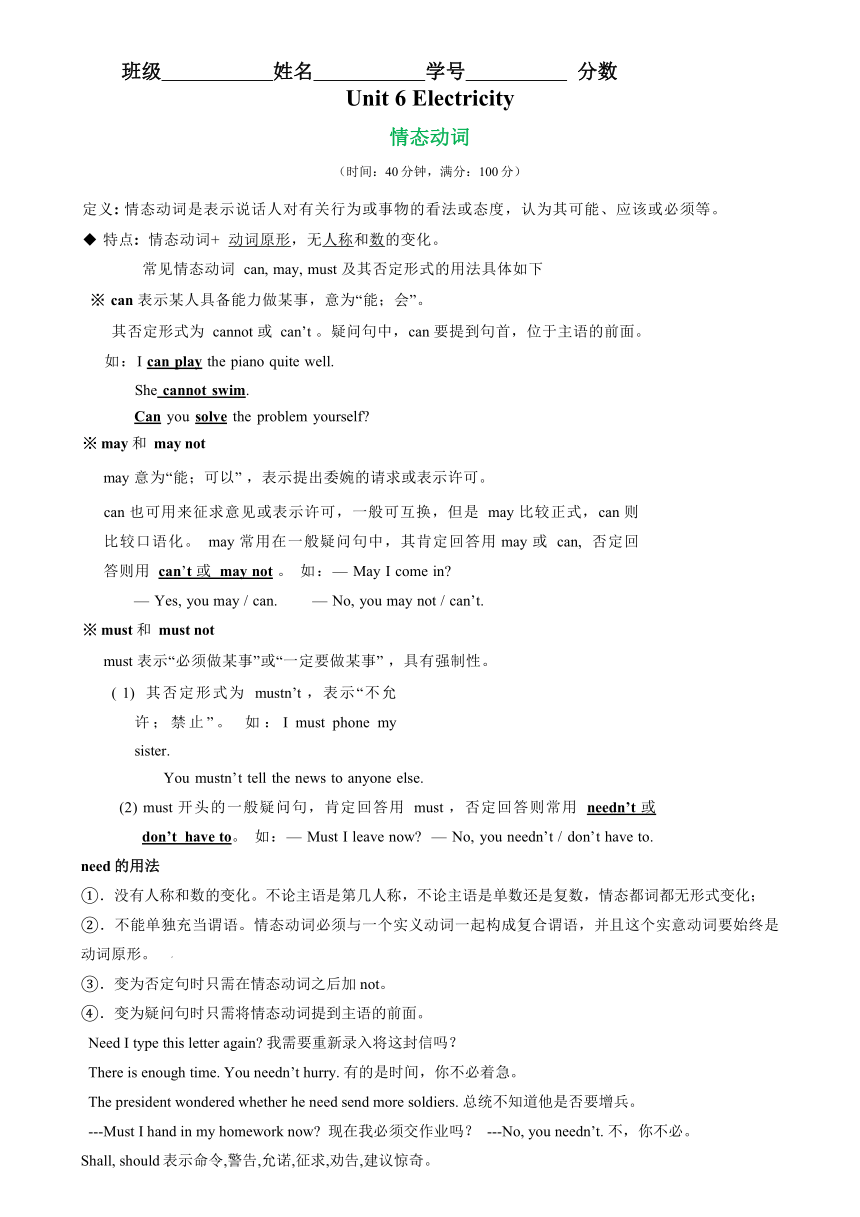
|
|
| 格式 | docx | ||
| 文件大小 | 45.4KB | ||
| 资源类型 | 教案 | ||
| 版本资源 | 牛津深圳版 | ||
| 科目 | 英语 | ||
| 更新时间 | 2024-05-10 00:00:00 | ||
图片预览

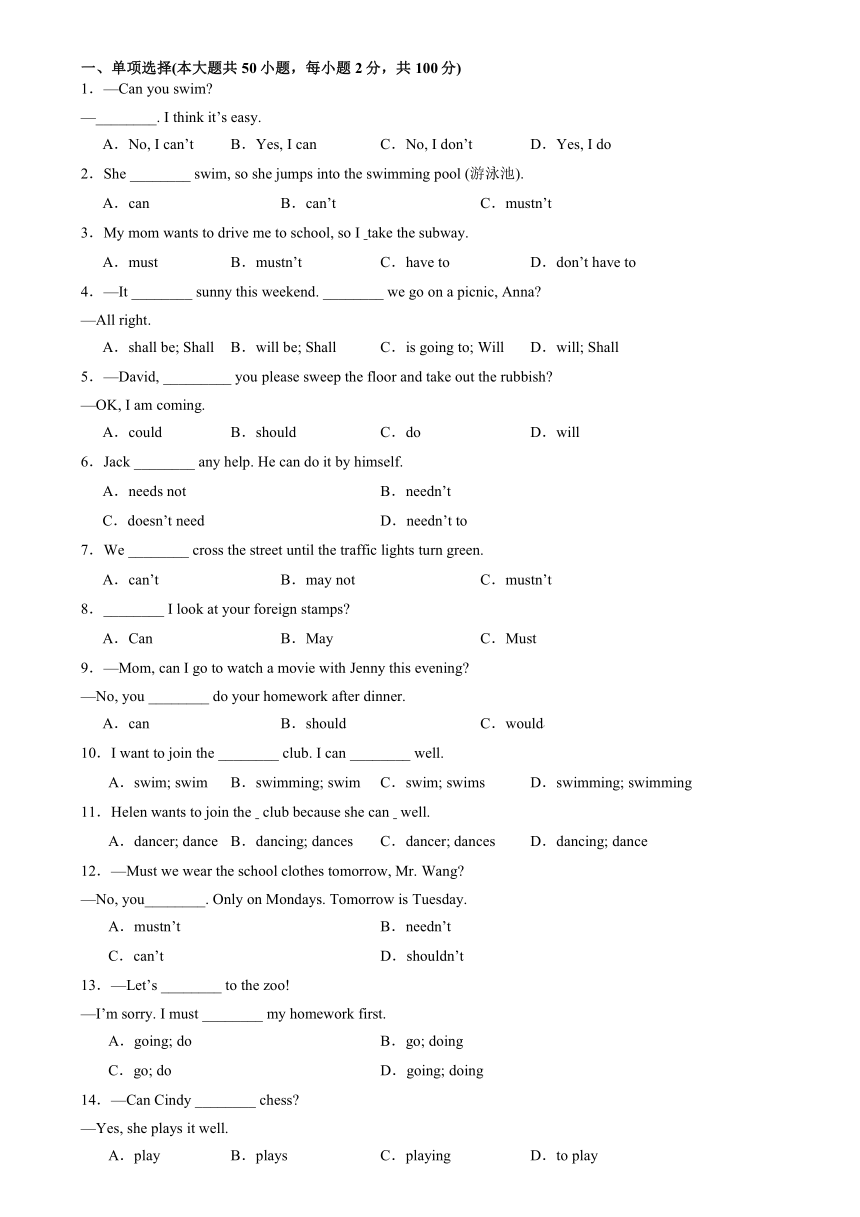
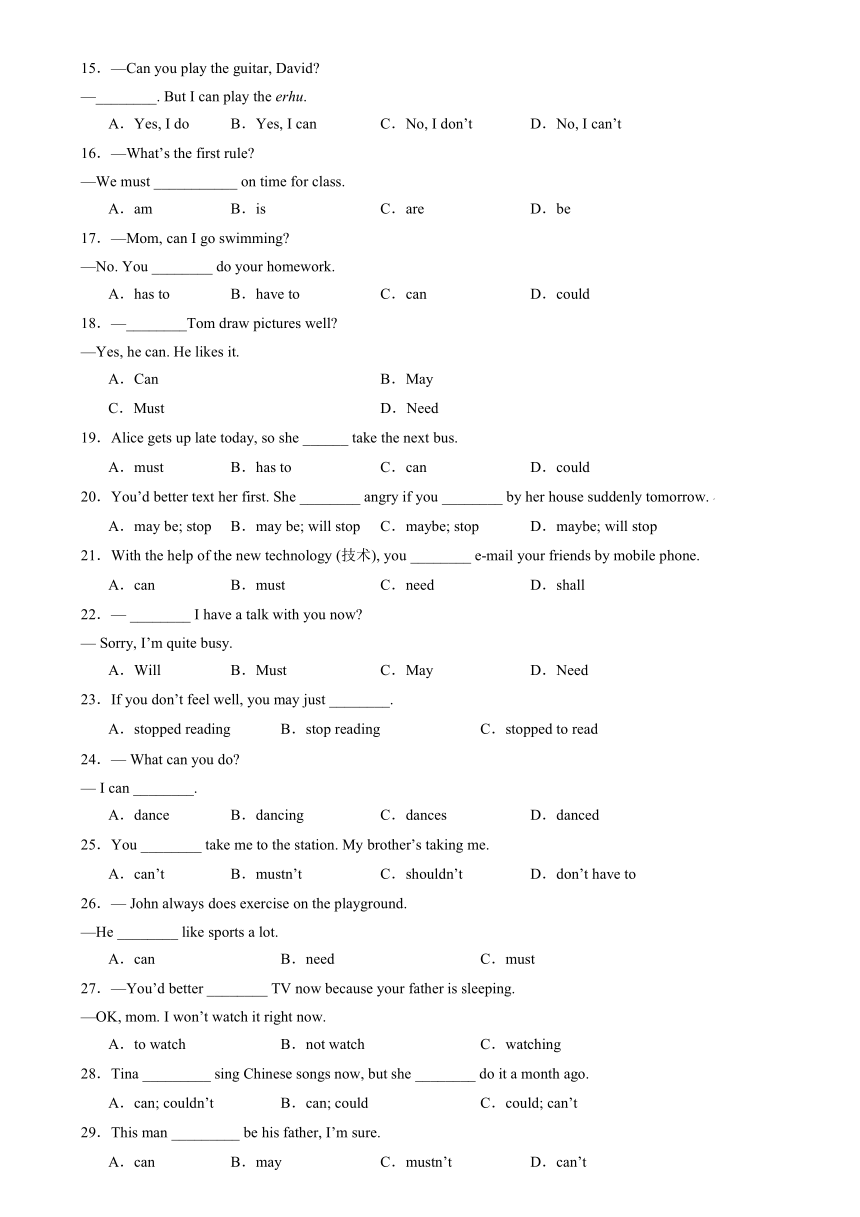
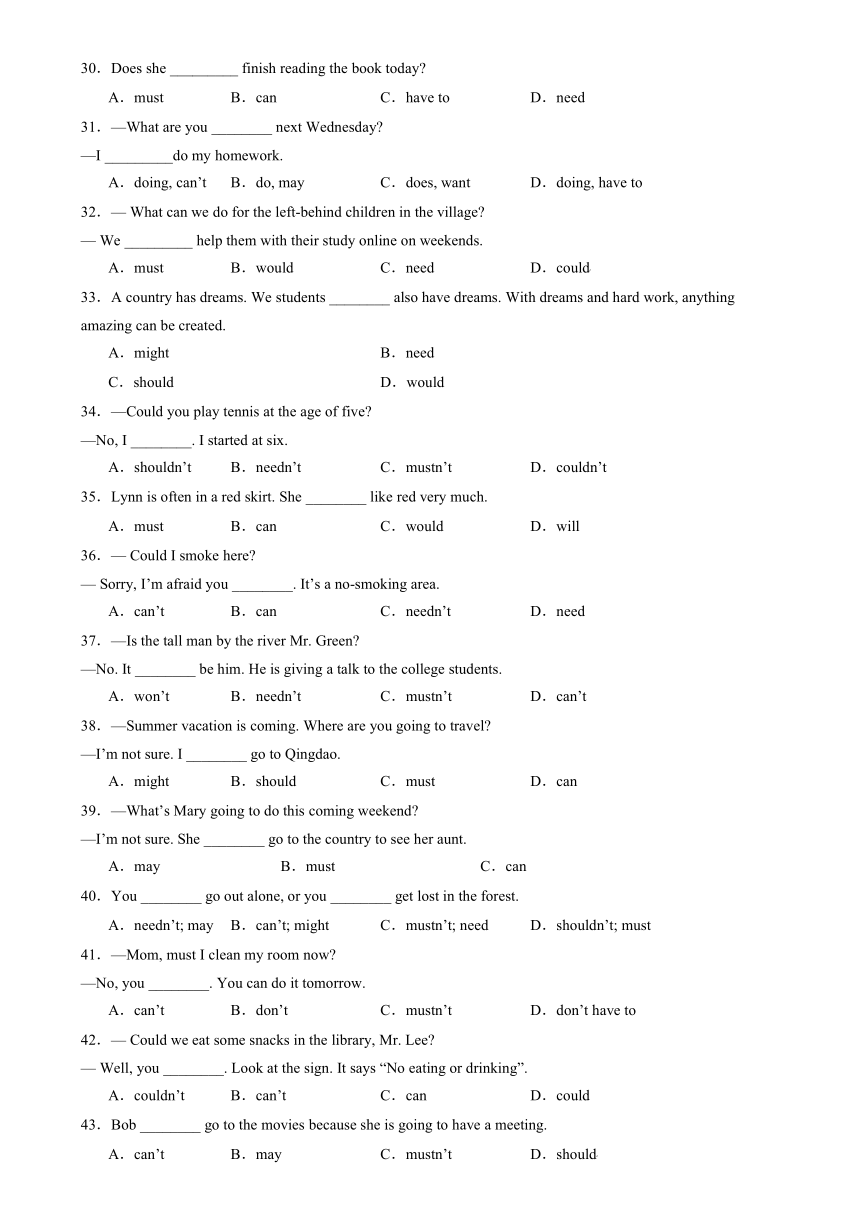
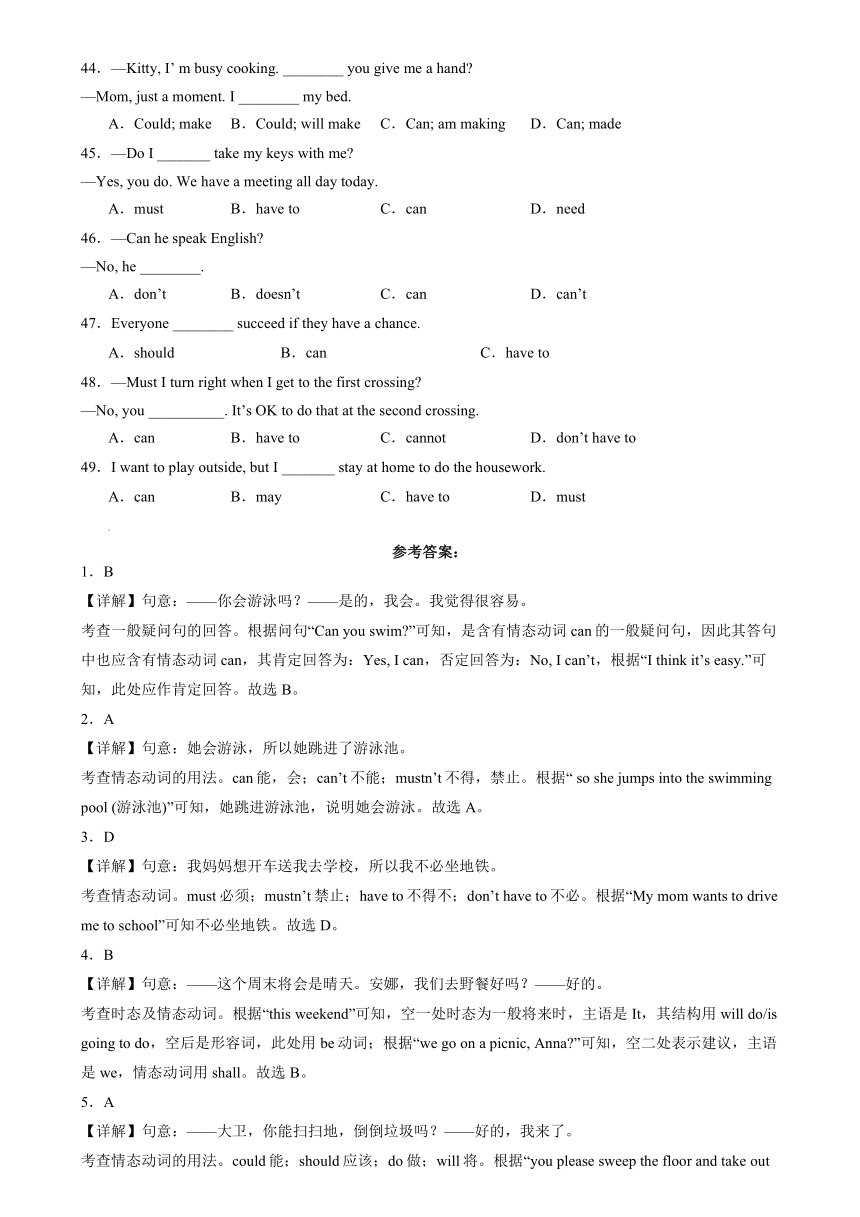
文档简介
班级 姓名 学号 分数
Unit 6 Electricity
情态动词
(时间:40分钟,满分:100分)
定义: 情态动词是表示说话人对有关行为或事物的看法或态度,认为其可能、应该或必须等。
◆ 特点: 情态动词+ 动词原形,无人称和数的变化。
常见情态动词 can, may, must 及其否定形式的用法具体如下
※ can 表示某人具备能力做某事,意为“能;会”。
其否定形式为 cannot 或 can’t 。疑问句中,can 要提到句首,位于主语的前面。
如:I can play the piano quite well.
She cannot swim.
Can you solve the problem yourself
※ may 和 may not
may 意为“能;可以” ,表示提出委婉的请求或表示许可。
can 也可用来征求意见或表示许可,一般可互换,但是 may 比较正式,can 则比较口语化。 may 常用在一般疑问句中,其肯定回答用may 或 can, 否定回答则用 can’t 或 may not 。 如:— May I come in
— Yes, you may / can. — No, you may not / can’t.
※ must 和 must not
must 表示“必须做某事”或“一定要做某事” ,具有强制性。
( 1) 其否定形式为 mustn’t ,表示“不允许;禁止”。 如:I must phone my sister.
You mustn’t tell the news to anyone else.
(2) must 开头的一般疑问句,肯定回答用 must ,否定回答则常用 needn’t 或 don’t have to。 如:— Must I leave now — No, you needn’t / don’t have to.
need的用法
①.没有人称和数的变化。不论主语是第几人称,不论主语是单数还是复数,情态都词都无形式变化;
②.不能单独充当谓语。情态动词必须与一个实义动词一起构成复合谓语,并且这个实意动词要始终是动词原形。
③.变为否定句时只需在情态动词之后加not。
④.变为疑问句时只需将情态动词提到主语的前面。
Need I type this letter again 我需要重新录入将这封信吗?
There is enough time. You needn’t hurry. 有的是时间,你不必着急。
The president wondered whether he need send more soldiers. 总统不知道他是否要增兵。
---Must I hand in my homework now 现在我必须交作业吗? ---No, you needn’t. 不,你不必。
Shall, should表示命令,警告,允诺,征求,劝告,建议惊奇。
一、单项选择(本大题共50小题,每小题2分,共100分)
1.—Can you swim
—________. I think it’s easy.
A.No, I can’t B.Yes, I can C.No, I don’t D.Yes, I do
2.She ________ swim, so she jumps into the swimming pool (游泳池).
A.can B.can’t C.mustn’t
3.My mom wants to drive me to school, so I take the subway.
A.must B.mustn’t C.have to D.don’t have to
4.—It ________ sunny this weekend. ________ we go on a picnic, Anna
—All right.
A.shall be; Shall B.will be; Shall C.is going to; Will D.will; Shall
5.—David, _________ you please sweep the floor and take out the rubbish
—OK, I am coming.
A.could B.should C.do D.will
6.Jack ________ any help. He can do it by himself.
A.needs not B.needn’t
C.doesn’t need D.needn’t to
7.We ________ cross the street until the traffic lights turn green.
A.can’t B.may not C.mustn’t
8.________ I look at your foreign stamps
A.Can B.May C.Must
9.—Mom, can I go to watch a movie with Jenny this evening
—No, you ________ do your homework after dinner.
A.can B.should C.would
10.I want to join the ________ club. I can ________ well.
A.swim; swim B.swimming; swim C.swim; swims D.swimming; swimming
11.Helen wants to join the club because she can well.
A.dancer; dance B.dancing; dances C.dancer; dances D.dancing; dance
12.—Must we wear the school clothes tomorrow, Mr. Wang
—No, you________. Only on Mondays. Tomorrow is Tuesday.
A.mustn’t B.needn’t
C.can’t D.shouldn’t
13.—Let’s ________ to the zoo!
—I’m sorry. I must ________ my homework first.
A.going; do B.go; doing
C.go; do D.going; doing
14.—Can Cindy ________ chess
—Yes, she plays it well.
A.play B.plays C.playing D.to play
15.—Can you play the guitar, David
—________. But I can play the erhu.
A.Yes, I do B.Yes, I can C.No, I don’t D.No, I can’t
16.—What’s the first rule
—We must ___________ on time for class.
A.am B.is C.are D.be
17.—Mom, can I go swimming
—No. You ________ do your homework.
A.has to B.have to C.can D.could
18.—________Tom draw pictures well
—Yes, he can. He likes it.
A.Can B.May
C.Must D.Need
19.Alice gets up late today, so she ______ take the next bus.
A.must B.has to C.can D.could
20.You’d better text her first. She ________ angry if you ________ by her house suddenly tomorrow.
A.may be; stop B.may be; will stop C.maybe; stop D.maybe; will stop
21.With the help of the new technology (技术), you ________ e-mail your friends by mobile phone.
A.can B.must C.need D.shall
22.— ________ I have a talk with you now
— Sorry, I’m quite busy.
A.Will B.Must C.May D.Need
23.If you don’t feel well, you may just ________.
A.stopped reading B.stop reading C.stopped to read
24.— What can you do
— I can ________.
A.dance B.dancing C.dances D.danced
25.You ________ take me to the station. My brother’s taking me.
A.can’t B.mustn’t C.shouldn’t D.don’t have to
26.— John always does exercise on the playground.
—He ________ like sports a lot.
A.can B.need C.must
27.—You’d better ________ TV now because your father is sleeping.
—OK, mom. I won’t watch it right now.
A.to watch B.not watch C.watching
28.Tina _________ sing Chinese songs now, but she ________ do it a month ago.
A.can; couldn’t B.can; could C.could; can’t
29.This man _________ be his father, I’m sure.
A.can B.may C.mustn’t D.can’t
30.Does she _________ finish reading the book today
A.must B.can C.have to D.need
31.—What are you ________ next Wednesday
—I _________do my homework.
A.doing, can’t B.do, may C.does, want D.doing, have to
32.— What can we do for the left-behind children in the village
— We _________ help them with their study online on weekends.
A.must B.would C.need D.could
33.A country has dreams. We students ________ also have dreams. With dreams and hard work, anything amazing can be created.
A.might B.need
C.should D.would
34.—Could you play tennis at the age of five
—No, I ________. I started at six.
A.shouldn’t B.needn’t C.mustn’t D.couldn’t
35.Lynn is often in a red skirt. She ________ like red very much.
A.must B.can C.would D.will
36.— Could I smoke here
— Sorry, I’m afraid you ________. It’s a no-smoking area.
A.can’t B.can C.needn’t D.need
37.—Is the tall man by the river Mr. Green
—No. It ________ be him. He is giving a talk to the college students.
A.won’t B.needn’t C.mustn’t D.can’t
38.—Summer vacation is coming. Where are you going to travel
—I’m not sure. I ________ go to Qingdao.
A.might B.should C.must D.can
39.—What’s Mary going to do this coming weekend
—I’m not sure. She ________ go to the country to see her aunt.
A.may B.must C.can
40.You ________ go out alone, or you ________ get lost in the forest.
A.needn’t; may B.can’t; might C.mustn’t; need D.shouldn’t; must
41.—Mom, must I clean my room now
—No, you ________. You can do it tomorrow.
A.can’t B.don’t C.mustn’t D.don’t have to
42.— Could we eat some snacks in the library, Mr. Lee
— Well, you ________. Look at the sign. It says “No eating or drinking”.
A.couldn’t B.can’t C.can D.could
43.Bob ________ go to the movies because she is going to have a meeting.
A.can’t B.may C.mustn’t D.should
44.—Kitty, I’ m busy cooking. ________ you give me a hand
—Mom, just a moment. I ________ my bed.
A.Could; make B.Could; will make C.Can; am making D.Can; made
45.—Do I _______ take my keys with me
—Yes, you do. We have a meeting all day today.
A.must B.have to C.can D.need
46.—Can he speak English
—No, he ________.
A.don’t B.doesn’t C.can D.can’t
47.Everyone ________ succeed if they have a chance.
A.should B.can C.have to
48.—Must I turn right when I get to the first crossing
—No, you __________. It’s OK to do that at the second crossing.
A.can B.have to C.cannot D.don’t have to
49.I want to play outside, but I _______ stay at home to do the housework.
A.can B.may C.have to D.must
参考答案:
1.B
【详解】句意:——你会游泳吗?——是的,我会。我觉得很容易。
考查一般疑问句的回答。根据问句“Can you swim ”可知,是含有情态动词can的一般疑问句,因此其答句中也应含有情态动词can,其肯定回答为:Yes, I can,否定回答为:No, I can’t,根据“I think it’s easy.”可知,此处应作肯定回答。故选B。
2.A
【详解】句意:她会游泳,所以她跳进了游泳池。
考查情态动词的用法。can能,会;can’t不能;mustn’t不得,禁止。根据“ so she jumps into the swimming pool (游泳池)”可知,她跳进游泳池,说明她会游泳。故选A。
3.D
【详解】句意:我妈妈想开车送我去学校,所以我不必坐地铁。
考查情态动词。must必须;mustn’t禁止;have to不得不;don’t have to不必。根据“My mom wants to drive me to school”可知不必坐地铁。故选D。
4.B
【详解】句意:——这个周末将会是晴天。安娜,我们去野餐好吗?——好的。
考查时态及情态动词。根据“this weekend”可知,空一处时态为一般将来时,主语是It,其结构用will do/is going to do,空后是形容词,此处用be动词;根据“we go on a picnic, Anna ”可知,空二处表示建议,主语是we,情态动词用shall。故选B。
5.A
【详解】句意:——大卫,你能扫扫地,倒倒垃圾吗?——好的,我来了。
考查情态动词的用法。could能;should应该;do做;will将。根据“you please sweep the floor and take out the rubbish”可知,这是一个表示请求允许的句子,用固定句式“could you please do sth”。故选A。
6.C
【详解】句意:杰克不需要任何帮助。他可以自己做这件事。
考查动词。need有两种词性,一种是情态动词,没有时态和三单变化,表示“需要”,其后接动词原形构成谓语;另一种是实义动词,本身充当谓语,有时态和三单变化,表示“需要”,其后接sth或to do作宾语。情态动词的否定直接在其后加not,实义动词的否定要借助助动词;根据设空处后的名词“any help”,可知此处need为实义动词,其否定要借助助动词,故
选C。
7.C
【详解】句意:在交通灯变绿之前,我们不得过马路。
考查情态动词。can’t不能(表示能力);may not不可能(表示可能性较小);mustn’t不得(表示禁止)。根据“until the traffic lights turn green”可知,此处表示在交通灯变绿之前,不得过马路。表示禁止。故选C。
8.B
【详解】句意:我可以看看你的外国邮票吗?
考查情态动词。Can可以;May可以;Must必须。“can”通常表达较为直接的请求,而“may”则显得更加客气和正式,并且更为礼貌。分析题干可知,此处表示请求,“May”比“Can”更符合语境。故选B。
9.B
【详解】句意:——妈妈,今晚我能和珍妮一起去看电影吗?——不,你应该在晚饭后做作业。
考查情态动词。can能够;should应该;would将。根据“No”可知,此处指你应该在晚饭后做作业。故选B。
10.B
【详解】句意:我想参加游泳俱乐部,我能游得很好。
考查动名词和动词的用法。根据“I want to join th...club. I can...well.”可知,第一空修饰名词club,故用动名词swimming;第二空位于情态动词can后,故用动词原形swim。故选B。
11.D
【详解】句意:海伦想加入舞蹈俱乐部,因为她舞跳得很好。
考查动词。根据“club”可知第一空填动名词作定语,填dancing;第二个空前有情态动词,因此用动词原形。故选D。
12.B
【详解】
句意:——王老师,我们明天必须穿校服吗?——不,你们不必。只有在每周一穿。明天是周二。
考查情态动词。mustn’t表示禁止;needn’t不必;can’t不能;shouldn’t不应该。以Must开头的一般疑问句,否定回答用needn’t。故选B。
13.C
【详解】句意:——让我们去动物园吧!——对不起。我必须先做我的家庭作业。
考查非谓语。let sb do sth“让某人做某事”,第一空用动词原形;情态动词must后跟动词原形。故选C。
14.A
【详解】句意:——Cindy会下棋吗?——会,她下得很好。
考查动词。根据“Can Cindy ... chess ”可知,情态动词can后应用动词原形,故选A。
15.D
【详解】句意:——-你会弹吉他吗,大卫?——不,我不能。但是我会拉二胡。
考查一般疑问句的回答。根据答语“But I can play the erhu”和上句“Can you play the guitar”可知,此处用can作否定回答,故选D。
16.D
【详解】句意:——第一个规则是什么?——我们必须按时上课。
考查情态动词的用法。must是情态动词,后加动词原形be。故选D。
17.B
【详解】句意:——妈妈,我可以去游泳吗?——不行,你必须做作业。
考查情态动词。has to不得不,必须,第三人称单数;have to不得不,必须;can能;could可以。根据“No”可知,必须待在家里做作业。故选B。
18.A
【详解】句意:——汤姆可以画得好吗?——是的,他可以。他喜欢它。
考查情态动词。Can能;May可以;Must必须;Need需要。根据“Yes, he can.”可知,空处应提问汤姆能画得好的吗,用情态动词can提问。故选A。
19.B
【详解】句意:爱丽丝今天起晚了,所以她不得不乘下一班公共汽车。
考查情态动词。must必须(主观需要);has to不得不(客观所迫);can能;could能,过去式。根据“take the next bus.”可知她起晚了,不得不乘下一班公共汽车,表示客观所迫,用has to。故选B。
20.A
【详解】句意:你最好先给她发个短信。如果你明天突然去她家,她可能会生气的。
考查情态动词和动词时态。may be可能,是“情态动词+be”的结构,可以作谓语;maybe可
能,是副词,不能作谓语。第一空需要谓语动词,排除CD;if引导的条件状语从句,遵循主将从现原则,从句用一般现在时,故选A。
21.A
【详解】句意:在新技术的帮助下,你能用手机给你的朋友发电子邮件。
考查情态动词辨析。can能;must一定;need需要;shall应该。根据语境可知,新技术可以让我们用手机发电子邮件,可推测此处是你能用手机给你的朋友发电子邮件,can“能”符合语境。故选A。
22.C
【详解】句意:——我现在可以和你谈谈吗?——对不起,我很忙。
考查情态动词。will将;must必须;may可以;need需要。根据“I have a talk with you now ”可知说话者在表示请求,应用may。故选C。
23.B
【详解】句意:如果你感觉不舒服,你可以停止阅读。
考查情态动词的用法和非谓语动词。根据“may”是情态动词可知,后接动词原形,排除AC选项;stop doing sth.“停止做某事”,stop to do sth.“停下来去做另一件事”;根据“If you don’t feel well, you may just ...”可知,此处指停止阅读,应用stop doing。故选B。
24.A
【详解】句意:——你能做什么 ——我会跳舞。
考查情态动词。根据“I can...”可知,指的是我能跳舞。情态动词后面接动词原形。故选A。
25.D
【详解】句意:你不必送我去车站。我哥哥带我去。
考查情态动词。can’t不能;mustn’t禁止;shouldn’t不应该;don’t have to不必,没必要。根据“My brother’s taking me.”可知,此处表示“你没必要送了”。故选D。
26.C
【详解】句意:——约翰总是在操场上做运动。——他一定很喜欢运动。
考查情态动词。can能够;need需要;must一定。根据“John always does exercise on the playground.”可知约翰总是在操场上做运动,所以他一定很喜欢运动。故选C。
27.B
【详解】句意:——你现在最好不要看电视,因为你爸爸在睡觉。——好的,妈妈。我现在不看了。
考查情态动词。You’d better是you had better的缩写,had better do sth“最好做某事”,否定直接在do前面加not即可,故选B。
28.A
【详解】句意:蒂娜现在会唱中文歌,但一个月前她不会。
考查情态动词。can能,能够。could是can的过去式,用于一般现在时态表示委婉的请求建议等语气。couldn’t 是can’t的过去式。根据“sing Chinese songs now”以及“but”转折可知,现在能唱中文歌曲了,但是一个月前不会,前半句描述现在的情况,应用情态动词can,后半句描述过去的事情,应用couldn’t,故选A。
29.D
【详解】句意:我确信这个人不可能是我爸爸。
考查情态动词。can能;may可能;mustn’t禁止;can’t不可能。根据“I’m sure”可知此处确信那个人一定不是自己的爸爸,表示否定推测用can’t。故选D。
30.C
【详解】句意:她今天必须读完这本书吗?
考查情态动词。must必须;can能;have to不得不;need需要。根据“Does...”可知must,can和need不能和助动词does连用,have to有第三人称单数。故选C。
31.D
【详解】句意:——下周三你要做什么?——我必须做作业。
考查时态以及情态动词。can’t不能;may可能;want想要;have to不得不。根据“What are you...”可知第一个空用现在分词和be动词构成现在进行时表将来,排除BC;根据“I...do my homework”可知必须做作业,用have to。故选D。
32.D
【详解】句意:——我们能为村里的留守儿童做些什么?——我们可以在周末帮助他们在线学习。
考查情态动词辨析。must必须;would将;need需要;could可以。根据“What can we do”可知,答语应说可以帮助他们在线学习,故选D。
33.C
【详解】句意:一个国家有梦想。我们学生也应该有梦想。有了梦想和努力,任何惊人的事情都可以被创造出来。
考查情态动词。might可能;need需要;should应该;would会。根据“With dreams and hard
work, anything amazing can be created.”可知,此处是说我们学生也应该有梦想。故选C。
34.D
【详解】句意:——你五岁的时候会打网球吗?——不,我不会。我六岁开始会的。
考查情态动词。shouldn’t不应该;needn’t不需要;mustn’t禁止;couldn’t不能。根据“Could you play the piano at the age of five ”可知,此处强调能力,回答不能,应用couldn’t。故选D。
35.A
【详解】句意:林恩经常穿红裙子。她一定很喜欢红色。
考查情态动词。must一定,表示肯定的推测;can可能;would会;will将。根据“Lynn is often in a red skirt”可知,通过经常穿红裙子可以知道她一定很喜欢红色。故选A。
36.A
【详解】句意:——我可以在这里吸烟吗?——对不起,恐怕不可以。这里是禁烟区。
考查情态动词。can’t不能;can能够;needn’t不需要;need需要。上文是Could引导的疑问句,表委婉语气。结合“It’s a no-smoking area.”可知,此处是禁烟区,因此不能吸烟,表否定回答,应用can’t。故选A。
37.D
【详解】句意:——在河边的那个高个子男人是格林先生吗?——不。不可能是他。他正在给大学生们做演讲。
考查情态动词。won’t将不;needn’t没必要;mustn’t不准;can’t不可能。根据下文“He is giving a talk to the college students”可知,格林先生正在做演讲,因此河边的男子不是他,表示否定推测。故选D。
38.A
【详解】句意:——暑假就要来临。你要去哪里旅行?——我不确定。我可能去青岛。
考查情态动词。might可能;should应该;must一定;can可以。根据“I’m not sure.”可知,此处表示没有把握的推测,因此用情态动词might,故选A。
39.A
【详解】句意:——这个周末玛丽打算做什么?——我不确定。她可能会去乡下看她的姑妈。
考查情态动词。may可能;must必须;can能够。根据“I’m not sure.”可知此处表示语气较弱的肯定推出,用may。故选A。
40.B
【详解】句意:你不能独自一人出去,否则你可能会在丛林中迷路。
考查情态动词。needn’t不需要;may可能;might可能;mustn’t禁止;can’t不能;need需要;must必须。根据“...go out alone, or you...”可知,第一空表达的是“不能”独自出去,可以用can’t或mustn’t,第二空表达的是不太确定的推测,应用might,故选B。
41.D
【详解】句意:——妈妈,我必须现在打扫房间吗? ——不,不需要。你可以明天做。
考查情态动词。can’t不能;don’t不,用于一般现在时含实意动词的否定句;mustn’t不许,禁止;don’t have to不必。must开头的一般疑问句,作否定回答时用needn’t或don’t have to。故选D。
42.B
【详解】句意:——我们在图书馆能吃一些零食吗,李老师?——哦,不行。看这个标志,它说“禁止饮食”。
考查情态动词辨析。couldn’t不能,过去式;can’t不能;can能够;could能够。此处不表示委婉,也不是过去时,排除could。图书馆禁止饮食,此处应用否定。故选B。
43.A
【详解】句意:Bob不能去看电影,因为她要去开会。
考查情态动词。can’t不能;may可能;mustn’t禁止;should应该。根据“because she is going to have a meeting.”可知因为有会要开,所以不能去看电影。故选A。
44.C
【详解】句意:——Kitty,我正忙着做饭。你能帮我一下吗?——妈妈,等一会。我正在整理我的床。
考查情态动词和现在进行时。Could表示委婉的请求;Can表示请求; make一般现在时;will make将来时;am making现在进行时。根据前文“just a moment”稍等一会,后面讲述的是某人正在做,所以应是现在进行时。故选C。
45.B
【详解】句意:——我必须带上钥匙吗?——是的。我们今天一整天都在会。
考查情态动词。must必须;have to不得不;can能够;need需要。含有must、can和need的一般疑问句以情态动词开头,根据句首助动词“Do”可知,排除选项A、C、D,故选B。
46.D
【详解】句意:——他会说英语吗?——不,他不会。
考查一般疑问句的回答。don’t 为助动词的否定;doesn’t 为助动词第三人称的否定; can能;can’t不能。由情态动词can引导的一般疑问句,其肯定回答用can,否定回答用can’t,故选D。
47.B
【详解】句意:如果有机会的话,每个人都能成功。
考查情态动词辨析。should应该,表示义务;can能够,表示能力;have to不得不,表示必要性。根据“Everyone...succeed if they have a chance.”可知,如果有机会,每个人都有成功的能力,用情态动词can。故选B。
48.D
【详解】句意:——我到第一个十字路口时必须向右转吗?——不,你不必。在第二个十字路口右转是可以的。
考查情态动词。can能;have to不得不;cannot不可能;don’t have to没必要。must开头的一般疑问句,肯定回答是Yes, you must;否定回答是No, you needn’t/don’t have to。故选D。
49.C
【详解】句意:我想出去玩,但是我不得不待在家里做家务。
考查情态动词的用法。can能,能够。一般用于表示能力;may可能,可以,也许;have to不得不,侧重于客观需要,有“不情愿”之意;must必须,侧重于说话者的主观看法,强调有责任有义务去做某事。本句指的是“我本想出去玩,但实际上不得不做家务”。故选C。
Unit 6 Electricity
情态动词
(时间:40分钟,满分:100分)
定义: 情态动词是表示说话人对有关行为或事物的看法或态度,认为其可能、应该或必须等。
◆ 特点: 情态动词+ 动词原形,无人称和数的变化。
常见情态动词 can, may, must 及其否定形式的用法具体如下
※ can 表示某人具备能力做某事,意为“能;会”。
其否定形式为 cannot 或 can’t 。疑问句中,can 要提到句首,位于主语的前面。
如:I can play the piano quite well.
She cannot swim.
Can you solve the problem yourself
※ may 和 may not
may 意为“能;可以” ,表示提出委婉的请求或表示许可。
can 也可用来征求意见或表示许可,一般可互换,但是 may 比较正式,can 则比较口语化。 may 常用在一般疑问句中,其肯定回答用may 或 can, 否定回答则用 can’t 或 may not 。 如:— May I come in
— Yes, you may / can. — No, you may not / can’t.
※ must 和 must not
must 表示“必须做某事”或“一定要做某事” ,具有强制性。
( 1) 其否定形式为 mustn’t ,表示“不允许;禁止”。 如:I must phone my sister.
You mustn’t tell the news to anyone else.
(2) must 开头的一般疑问句,肯定回答用 must ,否定回答则常用 needn’t 或 don’t have to。 如:— Must I leave now — No, you needn’t / don’t have to.
need的用法
①.没有人称和数的变化。不论主语是第几人称,不论主语是单数还是复数,情态都词都无形式变化;
②.不能单独充当谓语。情态动词必须与一个实义动词一起构成复合谓语,并且这个实意动词要始终是动词原形。
③.变为否定句时只需在情态动词之后加not。
④.变为疑问句时只需将情态动词提到主语的前面。
Need I type this letter again 我需要重新录入将这封信吗?
There is enough time. You needn’t hurry. 有的是时间,你不必着急。
The president wondered whether he need send more soldiers. 总统不知道他是否要增兵。
---Must I hand in my homework now 现在我必须交作业吗? ---No, you needn’t. 不,你不必。
Shall, should表示命令,警告,允诺,征求,劝告,建议惊奇。
一、单项选择(本大题共50小题,每小题2分,共100分)
1.—Can you swim
—________. I think it’s easy.
A.No, I can’t B.Yes, I can C.No, I don’t D.Yes, I do
2.She ________ swim, so she jumps into the swimming pool (游泳池).
A.can B.can’t C.mustn’t
3.My mom wants to drive me to school, so I take the subway.
A.must B.mustn’t C.have to D.don’t have to
4.—It ________ sunny this weekend. ________ we go on a picnic, Anna
—All right.
A.shall be; Shall B.will be; Shall C.is going to; Will D.will; Shall
5.—David, _________ you please sweep the floor and take out the rubbish
—OK, I am coming.
A.could B.should C.do D.will
6.Jack ________ any help. He can do it by himself.
A.needs not B.needn’t
C.doesn’t need D.needn’t to
7.We ________ cross the street until the traffic lights turn green.
A.can’t B.may not C.mustn’t
8.________ I look at your foreign stamps
A.Can B.May C.Must
9.—Mom, can I go to watch a movie with Jenny this evening
—No, you ________ do your homework after dinner.
A.can B.should C.would
10.I want to join the ________ club. I can ________ well.
A.swim; swim B.swimming; swim C.swim; swims D.swimming; swimming
11.Helen wants to join the club because she can well.
A.dancer; dance B.dancing; dances C.dancer; dances D.dancing; dance
12.—Must we wear the school clothes tomorrow, Mr. Wang
—No, you________. Only on Mondays. Tomorrow is Tuesday.
A.mustn’t B.needn’t
C.can’t D.shouldn’t
13.—Let’s ________ to the zoo!
—I’m sorry. I must ________ my homework first.
A.going; do B.go; doing
C.go; do D.going; doing
14.—Can Cindy ________ chess
—Yes, she plays it well.
A.play B.plays C.playing D.to play
15.—Can you play the guitar, David
—________. But I can play the erhu.
A.Yes, I do B.Yes, I can C.No, I don’t D.No, I can’t
16.—What’s the first rule
—We must ___________ on time for class.
A.am B.is C.are D.be
17.—Mom, can I go swimming
—No. You ________ do your homework.
A.has to B.have to C.can D.could
18.—________Tom draw pictures well
—Yes, he can. He likes it.
A.Can B.May
C.Must D.Need
19.Alice gets up late today, so she ______ take the next bus.
A.must B.has to C.can D.could
20.You’d better text her first. She ________ angry if you ________ by her house suddenly tomorrow.
A.may be; stop B.may be; will stop C.maybe; stop D.maybe; will stop
21.With the help of the new technology (技术), you ________ e-mail your friends by mobile phone.
A.can B.must C.need D.shall
22.— ________ I have a talk with you now
— Sorry, I’m quite busy.
A.Will B.Must C.May D.Need
23.If you don’t feel well, you may just ________.
A.stopped reading B.stop reading C.stopped to read
24.— What can you do
— I can ________.
A.dance B.dancing C.dances D.danced
25.You ________ take me to the station. My brother’s taking me.
A.can’t B.mustn’t C.shouldn’t D.don’t have to
26.— John always does exercise on the playground.
—He ________ like sports a lot.
A.can B.need C.must
27.—You’d better ________ TV now because your father is sleeping.
—OK, mom. I won’t watch it right now.
A.to watch B.not watch C.watching
28.Tina _________ sing Chinese songs now, but she ________ do it a month ago.
A.can; couldn’t B.can; could C.could; can’t
29.This man _________ be his father, I’m sure.
A.can B.may C.mustn’t D.can’t
30.Does she _________ finish reading the book today
A.must B.can C.have to D.need
31.—What are you ________ next Wednesday
—I _________do my homework.
A.doing, can’t B.do, may C.does, want D.doing, have to
32.— What can we do for the left-behind children in the village
— We _________ help them with their study online on weekends.
A.must B.would C.need D.could
33.A country has dreams. We students ________ also have dreams. With dreams and hard work, anything amazing can be created.
A.might B.need
C.should D.would
34.—Could you play tennis at the age of five
—No, I ________. I started at six.
A.shouldn’t B.needn’t C.mustn’t D.couldn’t
35.Lynn is often in a red skirt. She ________ like red very much.
A.must B.can C.would D.will
36.— Could I smoke here
— Sorry, I’m afraid you ________. It’s a no-smoking area.
A.can’t B.can C.needn’t D.need
37.—Is the tall man by the river Mr. Green
—No. It ________ be him. He is giving a talk to the college students.
A.won’t B.needn’t C.mustn’t D.can’t
38.—Summer vacation is coming. Where are you going to travel
—I’m not sure. I ________ go to Qingdao.
A.might B.should C.must D.can
39.—What’s Mary going to do this coming weekend
—I’m not sure. She ________ go to the country to see her aunt.
A.may B.must C.can
40.You ________ go out alone, or you ________ get lost in the forest.
A.needn’t; may B.can’t; might C.mustn’t; need D.shouldn’t; must
41.—Mom, must I clean my room now
—No, you ________. You can do it tomorrow.
A.can’t B.don’t C.mustn’t D.don’t have to
42.— Could we eat some snacks in the library, Mr. Lee
— Well, you ________. Look at the sign. It says “No eating or drinking”.
A.couldn’t B.can’t C.can D.could
43.Bob ________ go to the movies because she is going to have a meeting.
A.can’t B.may C.mustn’t D.should
44.—Kitty, I’ m busy cooking. ________ you give me a hand
—Mom, just a moment. I ________ my bed.
A.Could; make B.Could; will make C.Can; am making D.Can; made
45.—Do I _______ take my keys with me
—Yes, you do. We have a meeting all day today.
A.must B.have to C.can D.need
46.—Can he speak English
—No, he ________.
A.don’t B.doesn’t C.can D.can’t
47.Everyone ________ succeed if they have a chance.
A.should B.can C.have to
48.—Must I turn right when I get to the first crossing
—No, you __________. It’s OK to do that at the second crossing.
A.can B.have to C.cannot D.don’t have to
49.I want to play outside, but I _______ stay at home to do the housework.
A.can B.may C.have to D.must
参考答案:
1.B
【详解】句意:——你会游泳吗?——是的,我会。我觉得很容易。
考查一般疑问句的回答。根据问句“Can you swim ”可知,是含有情态动词can的一般疑问句,因此其答句中也应含有情态动词can,其肯定回答为:Yes, I can,否定回答为:No, I can’t,根据“I think it’s easy.”可知,此处应作肯定回答。故选B。
2.A
【详解】句意:她会游泳,所以她跳进了游泳池。
考查情态动词的用法。can能,会;can’t不能;mustn’t不得,禁止。根据“ so she jumps into the swimming pool (游泳池)”可知,她跳进游泳池,说明她会游泳。故选A。
3.D
【详解】句意:我妈妈想开车送我去学校,所以我不必坐地铁。
考查情态动词。must必须;mustn’t禁止;have to不得不;don’t have to不必。根据“My mom wants to drive me to school”可知不必坐地铁。故选D。
4.B
【详解】句意:——这个周末将会是晴天。安娜,我们去野餐好吗?——好的。
考查时态及情态动词。根据“this weekend”可知,空一处时态为一般将来时,主语是It,其结构用will do/is going to do,空后是形容词,此处用be动词;根据“we go on a picnic, Anna ”可知,空二处表示建议,主语是we,情态动词用shall。故选B。
5.A
【详解】句意:——大卫,你能扫扫地,倒倒垃圾吗?——好的,我来了。
考查情态动词的用法。could能;should应该;do做;will将。根据“you please sweep the floor and take out the rubbish”可知,这是一个表示请求允许的句子,用固定句式“could you please do sth”。故选A。
6.C
【详解】句意:杰克不需要任何帮助。他可以自己做这件事。
考查动词。need有两种词性,一种是情态动词,没有时态和三单变化,表示“需要”,其后接动词原形构成谓语;另一种是实义动词,本身充当谓语,有时态和三单变化,表示“需要”,其后接sth或to do作宾语。情态动词的否定直接在其后加not,实义动词的否定要借助助动词;根据设空处后的名词“any help”,可知此处need为实义动词,其否定要借助助动词,故
选C。
7.C
【详解】句意:在交通灯变绿之前,我们不得过马路。
考查情态动词。can’t不能(表示能力);may not不可能(表示可能性较小);mustn’t不得(表示禁止)。根据“until the traffic lights turn green”可知,此处表示在交通灯变绿之前,不得过马路。表示禁止。故选C。
8.B
【详解】句意:我可以看看你的外国邮票吗?
考查情态动词。Can可以;May可以;Must必须。“can”通常表达较为直接的请求,而“may”则显得更加客气和正式,并且更为礼貌。分析题干可知,此处表示请求,“May”比“Can”更符合语境。故选B。
9.B
【详解】句意:——妈妈,今晚我能和珍妮一起去看电影吗?——不,你应该在晚饭后做作业。
考查情态动词。can能够;should应该;would将。根据“No”可知,此处指你应该在晚饭后做作业。故选B。
10.B
【详解】句意:我想参加游泳俱乐部,我能游得很好。
考查动名词和动词的用法。根据“I want to join th...club. I can...well.”可知,第一空修饰名词club,故用动名词swimming;第二空位于情态动词can后,故用动词原形swim。故选B。
11.D
【详解】句意:海伦想加入舞蹈俱乐部,因为她舞跳得很好。
考查动词。根据“club”可知第一空填动名词作定语,填dancing;第二个空前有情态动词,因此用动词原形。故选D。
12.B
【详解】
句意:——王老师,我们明天必须穿校服吗?——不,你们不必。只有在每周一穿。明天是周二。
考查情态动词。mustn’t表示禁止;needn’t不必;can’t不能;shouldn’t不应该。以Must开头的一般疑问句,否定回答用needn’t。故选B。
13.C
【详解】句意:——让我们去动物园吧!——对不起。我必须先做我的家庭作业。
考查非谓语。let sb do sth“让某人做某事”,第一空用动词原形;情态动词must后跟动词原形。故选C。
14.A
【详解】句意:——Cindy会下棋吗?——会,她下得很好。
考查动词。根据“Can Cindy ... chess ”可知,情态动词can后应用动词原形,故选A。
15.D
【详解】句意:——-你会弹吉他吗,大卫?——不,我不能。但是我会拉二胡。
考查一般疑问句的回答。根据答语“But I can play the erhu”和上句“Can you play the guitar”可知,此处用can作否定回答,故选D。
16.D
【详解】句意:——第一个规则是什么?——我们必须按时上课。
考查情态动词的用法。must是情态动词,后加动词原形be。故选D。
17.B
【详解】句意:——妈妈,我可以去游泳吗?——不行,你必须做作业。
考查情态动词。has to不得不,必须,第三人称单数;have to不得不,必须;can能;could可以。根据“No”可知,必须待在家里做作业。故选B。
18.A
【详解】句意:——汤姆可以画得好吗?——是的,他可以。他喜欢它。
考查情态动词。Can能;May可以;Must必须;Need需要。根据“Yes, he can.”可知,空处应提问汤姆能画得好的吗,用情态动词can提问。故选A。
19.B
【详解】句意:爱丽丝今天起晚了,所以她不得不乘下一班公共汽车。
考查情态动词。must必须(主观需要);has to不得不(客观所迫);can能;could能,过去式。根据“take the next bus.”可知她起晚了,不得不乘下一班公共汽车,表示客观所迫,用has to。故选B。
20.A
【详解】句意:你最好先给她发个短信。如果你明天突然去她家,她可能会生气的。
考查情态动词和动词时态。may be可能,是“情态动词+be”的结构,可以作谓语;maybe可
能,是副词,不能作谓语。第一空需要谓语动词,排除CD;if引导的条件状语从句,遵循主将从现原则,从句用一般现在时,故选A。
21.A
【详解】句意:在新技术的帮助下,你能用手机给你的朋友发电子邮件。
考查情态动词辨析。can能;must一定;need需要;shall应该。根据语境可知,新技术可以让我们用手机发电子邮件,可推测此处是你能用手机给你的朋友发电子邮件,can“能”符合语境。故选A。
22.C
【详解】句意:——我现在可以和你谈谈吗?——对不起,我很忙。
考查情态动词。will将;must必须;may可以;need需要。根据“I have a talk with you now ”可知说话者在表示请求,应用may。故选C。
23.B
【详解】句意:如果你感觉不舒服,你可以停止阅读。
考查情态动词的用法和非谓语动词。根据“may”是情态动词可知,后接动词原形,排除AC选项;stop doing sth.“停止做某事”,stop to do sth.“停下来去做另一件事”;根据“If you don’t feel well, you may just ...”可知,此处指停止阅读,应用stop doing。故选B。
24.A
【详解】句意:——你能做什么 ——我会跳舞。
考查情态动词。根据“I can...”可知,指的是我能跳舞。情态动词后面接动词原形。故选A。
25.D
【详解】句意:你不必送我去车站。我哥哥带我去。
考查情态动词。can’t不能;mustn’t禁止;shouldn’t不应该;don’t have to不必,没必要。根据“My brother’s taking me.”可知,此处表示“你没必要送了”。故选D。
26.C
【详解】句意:——约翰总是在操场上做运动。——他一定很喜欢运动。
考查情态动词。can能够;need需要;must一定。根据“John always does exercise on the playground.”可知约翰总是在操场上做运动,所以他一定很喜欢运动。故选C。
27.B
【详解】句意:——你现在最好不要看电视,因为你爸爸在睡觉。——好的,妈妈。我现在不看了。
考查情态动词。You’d better是you had better的缩写,had better do sth“最好做某事”,否定直接在do前面加not即可,故选B。
28.A
【详解】句意:蒂娜现在会唱中文歌,但一个月前她不会。
考查情态动词。can能,能够。could是can的过去式,用于一般现在时态表示委婉的请求建议等语气。couldn’t 是can’t的过去式。根据“sing Chinese songs now”以及“but”转折可知,现在能唱中文歌曲了,但是一个月前不会,前半句描述现在的情况,应用情态动词can,后半句描述过去的事情,应用couldn’t,故选A。
29.D
【详解】句意:我确信这个人不可能是我爸爸。
考查情态动词。can能;may可能;mustn’t禁止;can’t不可能。根据“I’m sure”可知此处确信那个人一定不是自己的爸爸,表示否定推测用can’t。故选D。
30.C
【详解】句意:她今天必须读完这本书吗?
考查情态动词。must必须;can能;have to不得不;need需要。根据“Does...”可知must,can和need不能和助动词does连用,have to有第三人称单数。故选C。
31.D
【详解】句意:——下周三你要做什么?——我必须做作业。
考查时态以及情态动词。can’t不能;may可能;want想要;have to不得不。根据“What are you...”可知第一个空用现在分词和be动词构成现在进行时表将来,排除BC;根据“I...do my homework”可知必须做作业,用have to。故选D。
32.D
【详解】句意:——我们能为村里的留守儿童做些什么?——我们可以在周末帮助他们在线学习。
考查情态动词辨析。must必须;would将;need需要;could可以。根据“What can we do”可知,答语应说可以帮助他们在线学习,故选D。
33.C
【详解】句意:一个国家有梦想。我们学生也应该有梦想。有了梦想和努力,任何惊人的事情都可以被创造出来。
考查情态动词。might可能;need需要;should应该;would会。根据“With dreams and hard
work, anything amazing can be created.”可知,此处是说我们学生也应该有梦想。故选C。
34.D
【详解】句意:——你五岁的时候会打网球吗?——不,我不会。我六岁开始会的。
考查情态动词。shouldn’t不应该;needn’t不需要;mustn’t禁止;couldn’t不能。根据“Could you play the piano at the age of five ”可知,此处强调能力,回答不能,应用couldn’t。故选D。
35.A
【详解】句意:林恩经常穿红裙子。她一定很喜欢红色。
考查情态动词。must一定,表示肯定的推测;can可能;would会;will将。根据“Lynn is often in a red skirt”可知,通过经常穿红裙子可以知道她一定很喜欢红色。故选A。
36.A
【详解】句意:——我可以在这里吸烟吗?——对不起,恐怕不可以。这里是禁烟区。
考查情态动词。can’t不能;can能够;needn’t不需要;need需要。上文是Could引导的疑问句,表委婉语气。结合“It’s a no-smoking area.”可知,此处是禁烟区,因此不能吸烟,表否定回答,应用can’t。故选A。
37.D
【详解】句意:——在河边的那个高个子男人是格林先生吗?——不。不可能是他。他正在给大学生们做演讲。
考查情态动词。won’t将不;needn’t没必要;mustn’t不准;can’t不可能。根据下文“He is giving a talk to the college students”可知,格林先生正在做演讲,因此河边的男子不是他,表示否定推测。故选D。
38.A
【详解】句意:——暑假就要来临。你要去哪里旅行?——我不确定。我可能去青岛。
考查情态动词。might可能;should应该;must一定;can可以。根据“I’m not sure.”可知,此处表示没有把握的推测,因此用情态动词might,故选A。
39.A
【详解】句意:——这个周末玛丽打算做什么?——我不确定。她可能会去乡下看她的姑妈。
考查情态动词。may可能;must必须;can能够。根据“I’m not sure.”可知此处表示语气较弱的肯定推出,用may。故选A。
40.B
【详解】句意:你不能独自一人出去,否则你可能会在丛林中迷路。
考查情态动词。needn’t不需要;may可能;might可能;mustn’t禁止;can’t不能;need需要;must必须。根据“...go out alone, or you...”可知,第一空表达的是“不能”独自出去,可以用can’t或mustn’t,第二空表达的是不太确定的推测,应用might,故选B。
41.D
【详解】句意:——妈妈,我必须现在打扫房间吗? ——不,不需要。你可以明天做。
考查情态动词。can’t不能;don’t不,用于一般现在时含实意动词的否定句;mustn’t不许,禁止;don’t have to不必。must开头的一般疑问句,作否定回答时用needn’t或don’t have to。故选D。
42.B
【详解】句意:——我们在图书馆能吃一些零食吗,李老师?——哦,不行。看这个标志,它说“禁止饮食”。
考查情态动词辨析。couldn’t不能,过去式;can’t不能;can能够;could能够。此处不表示委婉,也不是过去时,排除could。图书馆禁止饮食,此处应用否定。故选B。
43.A
【详解】句意:Bob不能去看电影,因为她要去开会。
考查情态动词。can’t不能;may可能;mustn’t禁止;should应该。根据“because she is going to have a meeting.”可知因为有会要开,所以不能去看电影。故选A。
44.C
【详解】句意:——Kitty,我正忙着做饭。你能帮我一下吗?——妈妈,等一会。我正在整理我的床。
考查情态动词和现在进行时。Could表示委婉的请求;Can表示请求; make一般现在时;will make将来时;am making现在进行时。根据前文“just a moment”稍等一会,后面讲述的是某人正在做,所以应是现在进行时。故选C。
45.B
【详解】句意:——我必须带上钥匙吗?——是的。我们今天一整天都在会。
考查情态动词。must必须;have to不得不;can能够;need需要。含有must、can和need的一般疑问句以情态动词开头,根据句首助动词“Do”可知,排除选项A、C、D,故选B。
46.D
【详解】句意:——他会说英语吗?——不,他不会。
考查一般疑问句的回答。don’t 为助动词的否定;doesn’t 为助动词第三人称的否定; can能;can’t不能。由情态动词can引导的一般疑问句,其肯定回答用can,否定回答用can’t,故选D。
47.B
【详解】句意:如果有机会的话,每个人都能成功。
考查情态动词辨析。should应该,表示义务;can能够,表示能力;have to不得不,表示必要性。根据“Everyone...succeed if they have a chance.”可知,如果有机会,每个人都有成功的能力,用情态动词can。故选B。
48.D
【详解】句意:——我到第一个十字路口时必须向右转吗?——不,你不必。在第二个十字路口右转是可以的。
考查情态动词。can能;have to不得不;cannot不可能;don’t have to没必要。must开头的一般疑问句,肯定回答是Yes, you must;否定回答是No, you needn’t/don’t have to。故选D。
49.C
【详解】句意:我想出去玩,但是我不得不待在家里做家务。
考查情态动词的用法。can能,能够。一般用于表示能力;may可能,可以,也许;have to不得不,侧重于客观需要,有“不情愿”之意;must必须,侧重于说话者的主观看法,强调有责任有义务去做某事。本句指的是“我本想出去玩,但实际上不得不做家务”。故选C。
